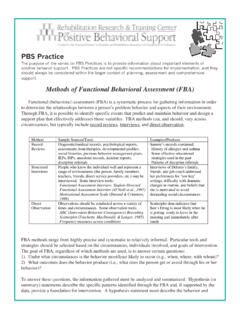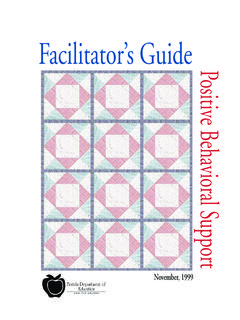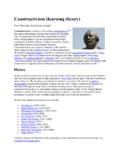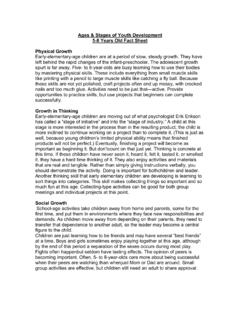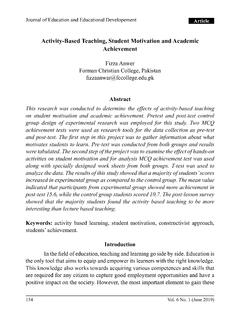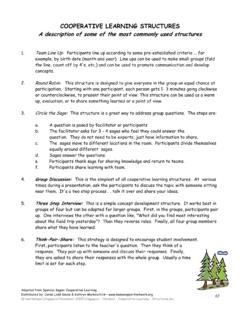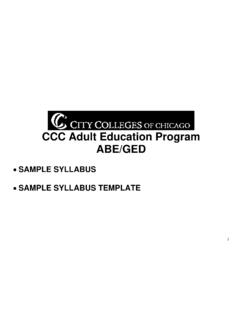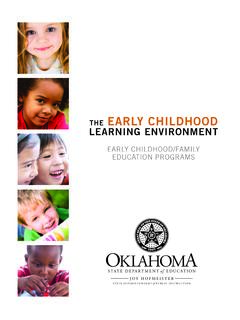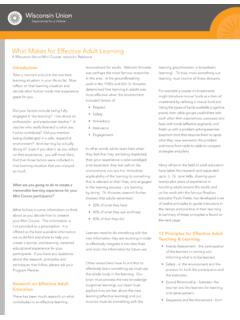Transcription of Functional Behavior Assessment and Behavior …
1 1 Functional Behavior Assessment and Behavior Intervention Plan Simpson School District USA Student Name: Bart Simpson DoB: 9/01/98 Age: 14 Grade: 9th School: Springfield Elementary School Student ID: 97531 FBA Date: 10/19/12 Programs/Services: General education BIP Date: 10/19/12 ---------------------------------------- ---------------------------------------- -------------------------------- Background information: Bart was referred for FBA by the RtI team on 9/5/12. He is not currently receiving any special education services. He is not presently on any medications per nurse report.
2 ---------------------------------------- ---------------------------------------- ----------------------------------- Team Members: Signatures Mr. Stage Teacher/Case Manager Ms. Iamgreat School Psychologist Mr. Superbowl T3 Behavior Coach Ms. Supervisor Assistant principal Ms. Skinner Behavior specialist Step 1: Problem ID-Target Behavior that will be the focus of the FBA and BIP: Off task After initially answering questions or writing sentences related to the assigned task, Bart will stop, look around the room, and talk with peers sitting nearby, laugh, and move materials around on his desk and will not independently return back to task. Baseline Data: Between 10/1/12 and 10/18/12, four direct observations during the independent work routine in English/Language arts using duration recording were conducted.
3 Between 10/1/12 and 10/18/12 the English/language arts teacher completed daily ratings of off-task Behavior (in which a rating of 5 indicated off-task duration of 80-100% of independent work time while a rating of 1 represented 0-20% off-task) Summary: Both the direct observations and the teacher daily ratings showed that on average between 10/1/12 and 10/18/12, Bart was off task during English/Language arts 80% of the independent work routine. Step 2: Problem Analysis: Sources of FBA/Data for Analysis Teacher interview-10/12/12 English/Language arts teacher Student interview-10/12/12 Direct observations School Psychologist-10/1/12, Behavior Specialist-10/5/12 Setting events: The team considered setting events and based on teacher and student interview, there are currently no setting events that would be considered slow triggers to the problem Behavior .
4 Antecedent events: Behavior has a high probability of occurring in the following conditions: 2 Non-preferred academic task demands, specifically independent assignments that require writing/paper-pencil; Tasks that are perceived boring, repetitive, non-meaningful The Behavior is considered to be a performance deficit Bart does have the academic skills to read and answer content comprehension questions and write paragraphs at grade level. Behavior has a low probability of occurring in the following conditions: During preferred activities that are more interactive and cooperative in nature ( , PE, extra-curricular activities, science lab) Activities in which writing is not required or is minimal ( , checking boxes or responses on tasks that do not go beyond one-page).
5 Consequence/Responses of others following problem Behavior : The following are the most typical responses that follows Bart s off-task Behavior : Teacher verbally redirects Teacher moves closer to Bart by walking over to table Teacher provides assistance to Bart Some peers begin to converse with Bart or make comments toward him Teacher verbally reprimands by warning Bart that he will not finish the task and will not earn a grade. Teacher verbally reprimands by telling Bart he will need to take the incomplete assignment home for homework. Hypothesis: When Bart is presented with a demand to do a non-preferred task, specifically a task that is independent and requires writing/paper-pencil use, Bart will get off-task (defined as after initially answering questions or writing sentences related to the assigned task, Bart will stop, look around the room, and talk with peers sitting nearby, laugh, and move materials around on his desk and will not independently return back to task).
6 As a result, Bart gets (a) to avoid/delay doing a non-preferred task and (b) teacher and peer attention. Functional Equivalent Replacement Behavior : Ask for a break Desired Behavior : Be academically engaged in non-preferred academic tasks ---------------------------------------- ---------------------------------------- ---------------------------------------- ---- Behavior Intervention Plan: Antecedent/Setting Event Strategies to prevent Behavior from occurring: Increase supervision Other: Peer cooperative work Modify amount of work Provide choices Modify presentation of work Provide extra help Teaching Interventions-what desired skills will you teach to replace the problem Behavior ?
7 Asking for help Asking for a break Managing feelings Asking for alone time Asking for attention Asking for an activity Problem solving Other Academic engagement Other Reinforcement: How will you reinforce the desired skills? Provide attention Provide work choice Provide down time Provide breaks Allow to pick class activity Preferred activity or object Other: Provide preferred breaks contingent upon being academically engaged Consequences: How will you minimize the payoff for the problem Behavior ? Redirect to replacement Behavior No eye contact or response ignored 3 Acknowledge when student does right thing Reward other students who are on task Intervention Plan Details Antecedent Interventions: Provide Choices What will be done?
8 1. Immediately after writing task is assigned to class, the teacher will call Bart up to her desk. 2. The teacher will present a choice to Bart. The choice will be between 2 activities from one of the following categories: (a) within a choice of materials to do the task ( , type of pen, computer or pencil/paper); (b) where a choice of where within the classroom Bart can do the writing (at desk, at table in back of room); (c) who a choice of who Bart may work with to do the task ( , specific peer, alone). 3. When presenting the choice, the teacher will say, Bart, to do your writing, do you want to use a pencil or do it on the computer? 4. As soon as Bart makes his choice, the teacher will honor his choice by acknowledging it and providing it- You made a great choice selecting the pencil/paper today.
9 Go ahead. Who will do this? Teacher When will it occur? Every day prior to independent writing assignment Where will it occur? In the classroom How will support be provide for the intervention? The school psychologist and Behavior specialist will review the intervention with the teacher and the student prior to starting the plan. Role play and practice will be used. The school psychologist or the Behavior specialist will touch base with the teacher within the first week of implementing the intervention to provide support. Antecedent Interventions: Peer cooperative Work What will be done? 1. At the beginning of each week, the teacher will determine which writing assignments will be appropriate for peer cooperative work.
10 Initially, at least 2 assignments will be arranged for peer cooperative work. 2. Prior to beginning the intervention, the teacher will solicit ground rules for expected behaviors when working cooperatively with peers. Examples may be (a) keep volume to whispers; (b) interact with materials in a way that gets the assignment completed during the timeframe; (c) raise hand to ask for help or to ask a question. 3. On the days that peer cooperative work will be appropriate, the teacher will select the Who category of choice to present to Bart. Immediately after announcing the peer cooperative assignment, the teacher will go over to Bart and present 2 peer options to him.
